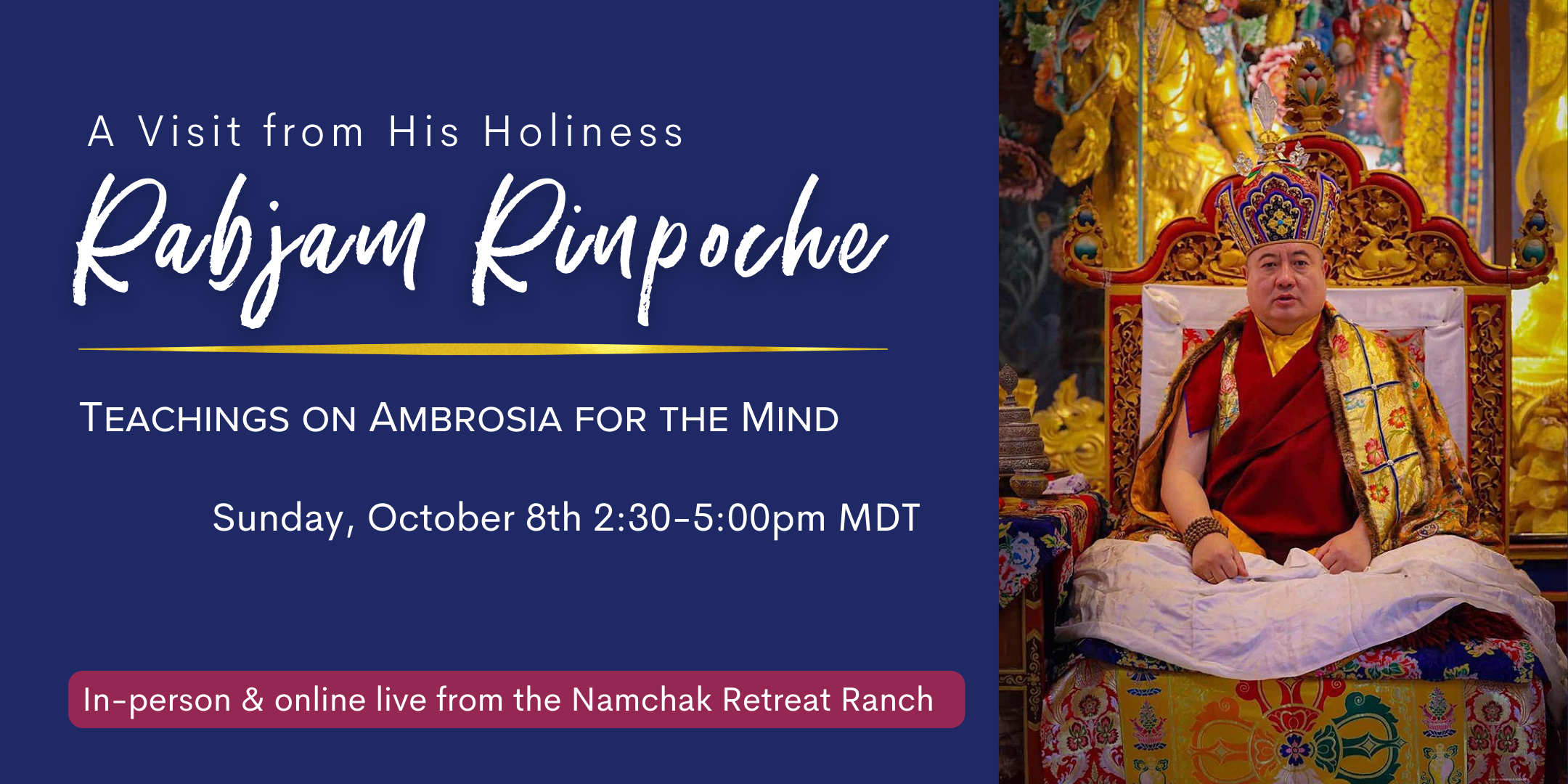In partnership with our friends at Ewam, we are honored to announce that Nyingma School of Tibetan Buddhism, world-renowned leader H.H. Shechen Rabjam Rinpoche will visit Montana from October 6-11 for a multi-day event full of consecrations, teachings, and empowerments. Rabjam Rinpoche, born in 1967, is the grandson and spiritual heir of Dilgo Khyentse Rinpoche. Since his grandfather’s passing in 1991, Rabjam Rinpoche has taken the responsibility of transmitting Dilgo Khyentse Rinpoche’s teachings and is bringing his vision for the preservation of Tibetan Buddhist teaching and culture to fruition.
With grateful hearts, Ewam and Namchak invite our community, neighbors, friends, and anyone interested to celebrate this rare occasion.
We are inviting everyone to attend Rabjam Rinpoche’s teachings on Sunday afternoon, which we will be streaming online for those who can’t join in person.
Sunday, October 8th, 2:30 p.m. – 5:00 p.m. (Online)
Rabjam Rinpoche will teach Ambrosia for the Mind, a text which is close to Rabjam Rinpoche’s heart, and which is important for the Khyentse lineage. It was composed by the great Jamyang Khyentse Wangpo and is a text which Rabjam Rinpoche recites daily, and which was recited daily by his grandfather and root guru Dilgo Khyentse Rinpoche. This text is a prayer for all the qualities of the Seven Points of Mind Training to arise in our mindstreams. We are very fortunate to receive these precious teachings, which will show us how to apply the preliminaries of the four thoughts, how to develop the two aspects of bodhicitta, to take adversity on the path, apply the practice throughout our lives, gauge our level of success, and apply the commitments and precepts for mind training.
Please use this registration form if you plan on attending these teachings online. If you would like to attend these teachings in person, please register HERE.
Zoom link will be provided upon registration. Please note: Confirmation emails from Eventbrite often end up in spam/promotions tab. Please check there if you do not see the confirmation email with the Zoom info.
Who is Rabjam Rinpoche?
H.H. Shechen Rabjam Rinpoche, born in 1967, is the grandson and spiritual heir of Dilgo Khyentse Rinpoche. Since his grandfather’s passing in 1991, Rabjam Rinpoche has taken the responsibility of transmitting Dilgo Khyentse Rinpoche’s teachings and is bringing his vision for the preservation of Tibetan Buddhist teaching and culture to fruition.
Rabjam Rinpoche is the seventh in the line of the Rabjam succession. The second Rabjam Rinpoche founded Shechen Monastery in Kham, eastern Tibet. The monastery became one of the six main Nyingma Monasteries in Tibet but was destroyed in the mid-twentieth century. At the age of three, Rabjam Rinpoche began taking teachings from his revered grandfather and today holds this unbroken lineage. He was raised by Dilgo Khyentse Rinpoche and attended almost every teaching, drupchen (9-day ceremony), and empowerment that he gave during his twenty-five years. He traveled throughout the world with Khyentse Rinpoche and first visited the West in 1976.
In the early 1980s, Dilgo Khyentse Rinpoche built Shechen Tennyi Dargyeling Monastery in Nepal and established Rabjam Rinpoche as its abbot. Today, there are 450 monks studying and practicing there under his guidance. Rabjam Rinpoche has created an administration and organization within the monk community that is a model of education, joyful discipline, and humanitarian activity.
Rabjam Rinpoche established the Shechen Philosophical College and the Shechen Retreat Center in Nepal. In response to the needs of women wanting to practice and study in the lineage of Dilgo Khyentse Rinpoche, he rebuilt and improved the facilities of the Sisinang Nunnery in Bhutan, where 180 nuns of all ages study and practice. In accordance with the wish of Dilgo Khyentse Rinpoche, he built a small Nyingma monastery and study center in Bodhgaya, India.
Rabjam Rinpoche maintains an active interest in the preservation of Tibetan culture. He has undertaken the completion of the stupas for peace project. Shechen Monastery in Tibet was renowned for its particular style of cham (sacred dance) and performance of rituals and chant. Rabjam Rinpoche is revitalizing that tradition. Under his leadership, the Shechen Dancers have performed throughout Europe and South America. In an effort to preserve the tradition of sacred painting, he created the Tsering Art School. His book, The Great Medicine, was published in English and other languages.
Rabjam Rinpoche’ has an acute interest in humanitarian projects. He is maintaining the authentic Tibetan Buddhist tradition as taught to him by his grandfather in combination with a modern interest in the needs of the community and its individuals.
Our Community Commitments:
In order to co-create a brave, inclusive, anti-oppressive and learning centered space, in our community we each agree to:
- Be inclusive of diverse opinions and backgrounds through treating each other with respect and appreciation.
- Commit to words and actions of non-harm within our group interactions.
- Learn by immersing in and committing to the practices at hand.
- Hold personal sharing in confidence.
- Be present, practice mindful listening, and not offer unsolicited advice.
- Allow and invite for equal sharing of voices as well as the right to pass.
- Take care not to speak for others in the group.
- Assume good intent and come from a place of curiosity and care.
- Come as we are with permission to be “raggedy.”
- Be mindful of and take personal and collective responsibility for our own biases including the use of language that may “other,” “cancel,” or dehumanize any person, groups of people, and/or their experiences.
- Ask for consent before hugging or initiating physical contact during in-person gatherings.
- Use the “Ouch/Oops” tool to address hurtful comments and language in the moment and to allow space for repair.*
We aspire for this sangha to be a place of refuge
*Ouch/Oops . This is a tool for addressing hurtful comments/language in the moment. If someone says something hurtful, anyone can bring attention to it in the moment by saying “Ouch” and then explaining what was hurtful. If it is a word choice issue, be sure to give the first speaker the chance to rephrase and try again (remember, it’s okay to be raggedy, and we are all assuming good intent!) When someone says something that comes out wrong or hurts someone else, they should start with “Oops” – first, acknowledge the impact of their words, and then try again. This can also be done outside of the event if someone feels an “Ouch,” but does not feel comfortable sharing it with the group at that time. We aspire for this sangha to be a place of refuge.

